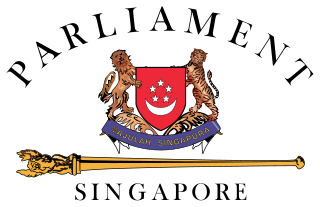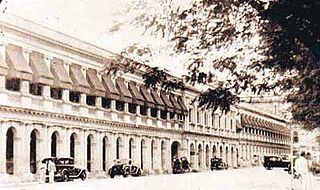Related Research Articles

A prime minister,premier or chief of cabinet is the head of the cabinet and the leader of the ministers in the executive branch of government, often in a parliamentary or semi-presidential system. Under those systems, a prime minister is not the head of state, but rather the head of government, serving as the principle administrator under either a monarch in a monarchy or a president in a republican form of government.

The Westminster system or Westminster model is a type of parliamentary government that incorporates a series of procedures for operating a legislature, first developed in England. Key aspects of the system include an executive branch made up of members of the legislature, and that is responsible to the legislature; the presence of parliamentary opposition parties; and a ceremonial head of state who is different from the head of government. The term comes from the Palace of Westminster, the current seat of the Parliament of the United Kingdom. The Westminster system is often contrasted with the presidential system that originated in the United States, or with the semi-presidential system, based on the government of France.

The Parliament of Canada is the federal legislature of Canada, seated at Parliament Hill in Ottawa, and is composed of three parts: the King, the Senate, and the House of Commons. By constitutional convention, the House of Commons is dominant, with the Senate rarely opposing its will. The Senate reviews legislation from a less partisan standpoint and may initiate certain bills. The monarch or his representative, normally the governor general, provides royal assent to make bills into law.
Acts of Parliament, sometimes referred to as primary legislation, are texts of law passed by the legislative body of a jurisdiction. In most countries with a parliamentary system of government, acts of parliament begin as a bill, which the legislature votes on. Depending on the structure of government, this text may then be subject to assent or approval from the executive branch.

A committee or commission is a body of one or more persons subordinate to a deliberative assembly. A committee is not itself considered to be a form of assembly. Usually, the assembly sends matters into a committee as a way to explore them more fully than would be possible if the assembly itself were considering them. Committees may have different functions and their types of work differ depending on the type of the organization and its needs.

A parliamentary system, or parliamentarian democracy, is a system of democratic governance of a state where the executive derives its democratic legitimacy from its ability to command the support ("confidence") of the legislature, typically a parliament, to which it is accountable. In a parliamentary system, the head of state is usually a person distinct from the head of government. This is in contrast to a presidential system, where the head of state often is also the head of government and, most importantly, where the executive does not derive its democratic legitimacy from the legislature.
Bicameralism is a type of legislature that is divided into two separate assemblies, chambers, or houses, known as a bicameral legislature. Bicameralism is distinguished from unicameralism, in which all members deliberate and vote as a single group. As of 2022, roughly 40% of world's national legislatures are bicameral, while unicameralism represents 60% nationally and much more at the subnational level.

The New Zealand Parliament is the unicameral legislature of New Zealand, consisting of the Sovereign (King-in-Parliament) and the New Zealand House of Representatives. The King is usually represented by his governor-general. Before 1951, there was an upper chamber, the New Zealand Legislative Council. The New Zealand Parliament was established in 1854 and is one of the oldest continuously functioning legislatures in the world. It has met in Wellington, the capital of New Zealand, since 1865.
A serjeant-at-arms, or sergeant-at-arms, is an officer appointed by a deliberative body, usually a legislature, to keep order during its meetings. The word "serjeant" is derived from the Latin serviens, which means "servant". Historically, serjeants-at-arms were armed men retained by English lords and monarchs, and the ceremonial maces which they are associated with were originally a type of weapon.

The president of Sri Lanka is the head of state and head of government of the Democratic Socialist Republic of Sri Lanka. The president is the chief executive of the union government and the commander-in-chief of the Sri Lanka Armed Forces.
A bill is a proposal for a new law, or a proposal to significantly change an existing law. A bill does not become law until it is passed by the legislature and has been, in most cases, approved by the executive. Once a bill has been enacted into law by the legislature, it is called an act of the legislature, or a statute. Bills are introduced in the legislature and are discussed, debated and voted upon.

The Parliament of the Democratic Socialist Republic of Sri Lanka is the supreme legislative body of Sri Lanka. It alone possesses legislative supremacy and thereby ultimate power over all other political bodies in the island. It is modeled after the British Parliament.

The Legislative Assembly of Ontario is the legislative chamber of the Canadian province of Ontario. Its elected members are known as Members of Provincial Parliament (MPPs). Bills passed by the Legislative Assembly are given royal assent by the lieutenant governor of Ontario to become law. Together, the Legislative Assembly and Lieutenant Governor make up the unicameral Legislature of Ontario or Parliament of Ontario. The assembly meets at the Ontario Legislative Building at Queen's Park in the provincial capital of Toronto.
Parliamentary privilege is a legal immunity enjoyed by members of certain legislatures, in which legislators are granted protection against civil or criminal liability for actions done or statements made in the course of their legislative duties. It is common in countries whose constitutions are based on the Westminster system.

The Parliament of Singapore is the unicameral legislature of the Republic of Singapore, which governs the country alongside the president of Singapore. Largely based upon the Westminster system, the Parliament is made up of Members of Parliament (MPs) who are elected, as well as Non-constituency Members of Parliament (NCMPs) and Nominated Members of Parliament (NMPs) who are appointed. Following the 2020 general election, 93 MPs and two NCMPs from three political parties were elected to the 14th Parliament. Throughout the sitting of Parliament, nine NMPs are usually appointed by the president on a biennial basis.
A reading of a bill is a stage of debate on the bill held by a general body of a legislature.

The Speaker of the Parliament of the Democratic Socialist Republic of Sri Lanka is the presiding officer of the chamber. The current Speaker of the Parliament is Mahinda Yapa Abeywardena, in office since 20 August 2020. The Speaker fulfills a number of important functions in relation to the operation of the House, which is based upon the British Westminster Parliamentary system.

The Senate was the upper chamber of the parliament of Ceylon established in 1947 by the Soulbury Commission. The Senate was appointed and indirectly elected rather than directly elected. It was housed in the old Legislative Council building in Colombo Fort and met for the first time on 12 November 1947. The Senate was abolished on 2 October 1971 by the eighth amendment to the Soulbury Constitution, prior to the adoption of the new Republican Constitution of Sri Lanka on 22 May 1972. In 2010 there were proposals to reintroduce the Senate.

Ajith Perera is a Sri Lankan politician and member of Parliament, who commenced his political career as a member of the Provincial Council of the Western Provincial Council in 2009. A lawyer by profession, he was first elected to the Parliament of Sri Lanka in 2010 as a member of the United National Party from the Kalutara District. He was re-elected to the Parliament in 2015.
The 19th Amendment (19A) to the Constitution of Sri Lanka was passed by the 225-member Sri Lankan Parliament with 215 voting in favor, one against, one abstained and seven were absent, on 28 April 2015. The amendment envisages the dilution of many powers of Executive Presidency, which had been in force since 1978. It is the most revolutionary reform ever applied to the Constitution of Sri Lanka since JR Jayawardhane became the first Executive President of Sri Lanka in 1978.
References
- ↑ In Italy the Constitutional Court, in its judgment no. 241 of 2007, stated that, at the ending of a Committee, its legal standing is absorbed by the House as a whole: Buonomo, Giampiero (2008). "Caso Ilaria Alpi: quando la leale collaborazione tra poteri dello Stato è tradita (e non dai magistrati)". Diritto&Giustizia Edizione Online. Archived from the original on 2012-08-01. Retrieved 2016-04-09.
- ↑ - Education 2020, definition of "select committee"
- ↑ - Select Committee in India
- ↑ "Select Committees". parliament.lk. Parliament of Sri Lanka. Retrieved 11 March 2022.